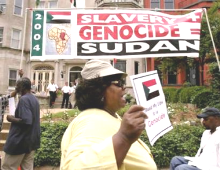US Cities and states move against genocide in Darfur: report
By Zenitha Prince
Baltimore, Mar 9, 2005 (NNPA) — The U.S. campaign to end genocide in Darfur, Sudan, is quietly forging ahead from the streets to statehouses nationwide, campaign leaders said.
“We’re moving ahead,” said Joe Madison, radio host and co-leader of the Sudan Campaign.

|
|
Protestors march outside the Embassy of the Republic of Sudan, in Washington July 13, 2004. (Reuters). |
The world’s attention on the continued massacring of ethnic Africans in Darfur was largely washed away by a swollen tide of media coverage of the tsunami disaster in Asia.
“It was unfortunate, but it’s just the way society is, especially when there are a lot of White Europeans involved,” Madison said.
But unlike the Asian tsunami, which was a force of nature and thus unavoidable,” Madison continued, “The Sudan ‘tsunami’ was done by man: one, it could have been prevented; and two, it could be stopped.”
The coalition was largely responsible, along with the Congressional Black Caucus, for prodding both the Congress and the White House to label the systematic killing of Black Africans of the Fur, Zhagawa and Masalit tribes as genocide and to get involved in the conflict between the Sudanese government, its cohort, the Janjaweed militia, and Black rebels.
Now, they have ramped up their agenda, with several lawmakers introducing measures in legislatures in New Jersey, California, Illinois and Maryland to divest about $91 billion in U.S. pension and retirement funds from 83 publicly traded companies with holdings in oil-rich Sudan. The strategy was successfully used against the South African government during its days of apartheid, and activists feel it can be effective again.
“There has been no hesitation,” Madison said of the legislation’s reception in New Jersey, where bills were first introduced. “In both (the House and Senate), hearings received a majority vote and bipartisan support.”
The campaign’s work continues amidst the resolution of another situation it was involved in – the 21-year civil war between Sudan’s Muslim North and Christian South, which has left about 1.5 million people dead.
Even that good news is overshadowed, however, by the continuing attacks on civilians in Darfur. United Nations officials say the agreement’s success may hinge on the culmination of that conflict.
The mayhem in this southwestern state erupted two years ago when the Sudan Liberation Movement/Army and the Justice and Equality Movement staged an uprising to force the government to give Black Darfurians their fair share of the region’s oil wealth. In retaliation, the government armed and authorized Arab militias to attack the rebels’ villages, resulting in the deaths of about 70,000 men, women and children; the displacement of about 2 million Darfurians; and untold misery caused by rapes, tortures and the wholesale destruction of crops, animals and villages.
When world censure fell on its head and the United Nations stepped in, the government danced around the issue, ignoring ultimatums, breaking agreements and blaming the rebels.
But “the impact of the attacks on civilians shows that the use of military force was manifestly disproportionate to any threat posed by rebels,” stated a January 2005 report on Darfur by the International Commission of Inquiry.
The report, which is the culmination of a three-month investigation into the situation in Darfur, stated that, while the yet persistent killings in Darfur do not constitute genocide, the situation poses a “threat to international peace and security.”
Many actions on the parts of the Sudanese government, the Janjaweed and members of JEM and SLM/A are crimes against humanity, the report continued, and the perpetrators should be prosecuted.
“The prosecution by the (International Criminal Court) of persons allegedly responsible for the most serious crimes in Darfur would contribute to the restoration of peace in the region.”
Material published originally by the SF Bay View.
